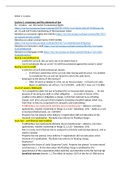Week 1-4 notes:
Lecture 1: consumers and the elements of law
EU –treaties – art. 38 Charter Fundamental Rights
https://eur-lex.europa.eu/legal-content/EN/TXT/HTML/?uri=CELEX:12012P/TXT&from=NL
art. 12 and 169 Treaty Functioning of the European Union
Directive on consumer rights 2011/83/EU https://eur-lex.europa.eu/legal-content/EN/TXT/?
uri=celex%3A32011L0083
Directive on unfair contract terms 1993/13/EEG
https://eur-lex.europa.eu/legal-content/EN/TXT/?uri=CELEX%3A31993L0013
Directive on Consumer credit https://eur-lex.europa.eu/legal-content/EN/ALL/?uri=celex
%3A32008L0048
Directive on Mortgage credit https://eur-lex.europa.eu/legal-content/EN/ALL/?uri=celex
%3A32014L0017
Buying a secondhand car
- A sells the car to B; the car turns out to be stolen from X
- Can X revindicate the car as his? Or will B be protected against the owner’s claim?
Buying a car on credit
- A sells the car to B with contractual clauses:
o B will have ownership of the car only after having paid the price; A is entitled
to revindicate the car and not bound to return the paid terms.
- Keeping B to the terms of the contract?
o After 30 years of debate in 1936: act on hire-purchase – in Dutch civil code.
Buyer is entitled to set-off (art. 7:A 1576t BW – until 2017 now: art.7:92 BW).
Court of session, Edinburgh
- "It is competent under the law of Scotland for an incorporated company . . . for the
purpose of securing any debt or other obligation . . . to create in favour of the
creditor in the debt or obligation a charge, in this Part referred to as a floating
charge, over all or any part of the property (including uncalled capital) which may
from time to time be comprised in its property and undertaking."
- Traditionibus non nudis pactis dominia rerum transferuntur = delivery, not mere
agreements, transfer ownership in things (C.2.3.20 - Diocletian, 293) – holds as a rule
in Scotland (Netherlands: art. 3:84 BW)
- Property has not passed, since delivery (=registration) did not take place at the
moment of crystallization. The Bank may enforce its Floating Charge.
Scots law – civil (Roman law) tradition
- Traditionibus non nudis pactis dominia rerum transferuntur = delivery, not mere
agreements, transfer ownership in things (C.2.3.20 - Diocletian, 293)
- Not in a code, but in Roman law as analysed in scholarly work (jurisprudence), and as
used in caselaw.
- Property has not passed, since delivery (= registration) did not take place at the
moment of crystallization. The Bank may enforce its floating charge.
- Thomsons?
- Appeal to the House of Lords (Supreme Court). Property has passed `to some extent’
- Lord Jauncey: (…) At the time when the floating charge crystallised by the
appointment of the respondents Albyn held the recorded title to the flat but had no
beneficial interest therein. (…) The effect of section 53(7) of the Act of 1986 was to
, make available as security all the property in which Albyn had a beneficial interest.
Since Albyn had no such interest in the flat at the date of crystallisation it follows
that the floating charge did not attach thereto. I would for these reasons allow the
appeal.
- German law and Dutch law protect the consumer-buyer of a home
- … the sale of registered property may be registered in the public registers ….
- .. if the buyer is a natural person, not acting in the course of business….
- .. a transfer or burden after this registered sale cannot have effect against the buyer.
Civil law: based on Roman law
- As codified in 529-534 by Justinian
o What is a code? Systematic book of all-rules encompassing legislation, issued
by a sovereign, with exclusive force (no other rules apply)
- Reception of roman law still present
Corpus Iuris Civilis (Codex, Digests, Institutes)
The institutional Scheme
• General Part
• 1 Persons
• 2 Things (property)
• 3 Obligations (contract and tort)
• 4 Actions
• And many concepts (person, thing, ownership, obligation) and rules (transfer,
performance)
Common law - civil law But also: common law - equity
- More Jurisdictions
- Engeland and Wales
- Northern Ireland
- Scotland (mixed)
- And: US, Canada (-Quebec), Australia, N-Zealand …
Customary law – no Roman law!
- Later: statutes
Caselaw
Royal Courts
Court of Chancery
- “For the love of God and by way of charity”
- Foundation: justice, equity
Equity vs. Common Law
• Equity supports, corrects the Common law
• Since 1875 by the same courts
• Examples
• Trusts – protection of the buyer of immovables?
, • Redemption of mortgages – has the holder of the mortgage right to surplus
value?
• Specific performance – has the creditor the right to specific performance?
• Sharp v Thomson was fueled by this English concept.
Civil Law vs. Common Law
• History: Roman law? Feudal law?
• Sources: codification or case law?
• Scotland, South Africa (civil law, but no codification)
• Sources: common law/equity?
• Reasoning: deductive or inductive?
• Mixed jurisdictions
o Scotland, South Africa, Quebec, Louisiana, Sri Lanka
o Property law always civilian
• In property law:
o One uniform law of property?
o Types of rights? Ownership?
o Equity, trust?
o Security rights: functional approach?
• In Contract law:
o Underlying duty of good faith?
o Obligations interpreted on text or context?
o Specific performance or compensation?
International transactions and national law concerning consumers
• Which law applies?
o Traditionally: Property law: law of place of object & contract law: law agreed
upon
• Consumers: Rome I Regulation (https://eur-lex.europa.eu/legal-content/EN/ALL/?
uri=CELEX%3A32008R0593)
• Art. 6 … jurisdiction of habitual residence of consumer
Uniformity (EH Hondius, Towards a European Civil Code)?
Legislators – Treaties, EU, national legislation
Courts – ECHR, ECJ, national courts - making decisions in line with higher norms or foreign
norms
Scholars – Common Frame of Reference; Principles, Common Core … comparative research
in general
Lecture 2: consumer law and regulation 2
- ‘consumer’ means a natural person who, in transactions covered by this Directive, is
acting for purposes which are outside his trade, business or profession.





